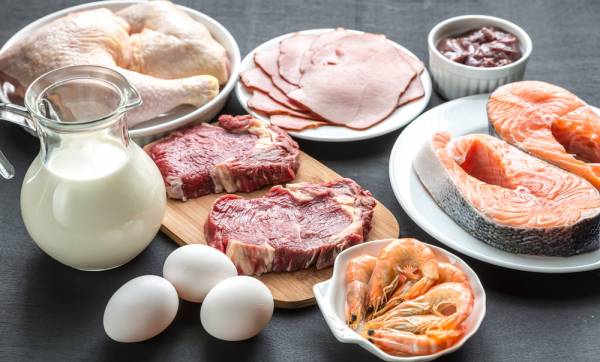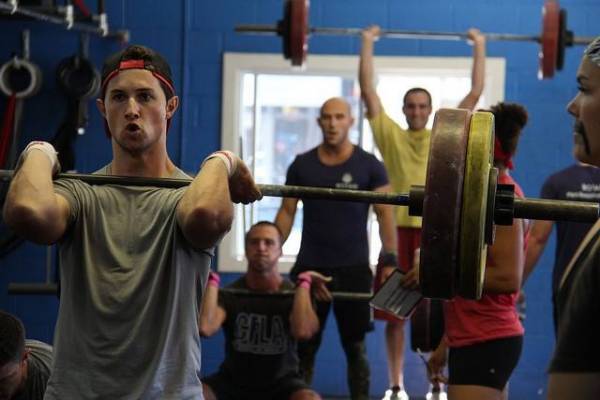CrossFitters: The 3 Letters You Need to Know in Supplements
“If you had to choose one supplement to take for performance, what it would be?” I’m often asked this question. Amid the myriad of information and bro-science out there it is hard to grasp which supplements can offer you the most bang for your buck.
CrossFit, the Sport of Fitness, is ever evolving. Competitors are getting fitter, faster, and stronger, and the standards of competition are improving all the time. Because of this, we need a better understanding of how to maximize training potential. As training volume and intensity increase, so does our need to improve our nutrition to fuel and recover from workouts more effectively. This is where supplements play a vital role.
Nutrition for Optimal Performance
There are no truly essential supplements. They are called “supplements” for a reason – in general, they are meant as an addition your diet. They are not meant to replace meals or nutrients that you can get from whole foods or healthy sources.
I find it hard to pinpoint one supplement I would recommend for performance, so instead I think in terms of nutrition for optimal performance. For this, you have three key areas – pre-workout, post-workout, and intra-workout.
“[I]f you take your CrossFit performance seriously, I would strongly consider adding these three key supplements into your nutrition plan.“
Supplementing correctly at these times can have positive effects on performance including:
- Increasing work capacity
- Reducing recovery between rounds, intervals, or sets
- Improving tolerance to volume of training
- Improving recovery between sessions
I’ve put together a list of the three main supplements to take at these key times, and ranked them in terms of:
- How well they work (from both personal experience and performance in studies)
- How well researched they are
- How cost effective they are.
As it turns out, choosing supplements really is as simple as ABC.
A – Amino Acids
This could just as easily have been “P” for protein, but then it wouldn’t have been as catchy as ABC. Amino acids are the building blocks of protein, and protein intake plays a huge role in both body composition and recovery from exercise.
Supplementing with protein or branched chain amino acids (BCAAs) can help prevent muscle breakdown during exercise and has been shown to improve recovery, decrease muscle soreness, and improve body composition.1,2

The most commonly supplemented amino acid is leucine (a branched chain amino acid that is prominent in whey protein powders). Leucine plays a significant role in building muscle tissue. It can be found in many food sources, but is generally found in higher concentrations in whey and dairy products, making these ideal to improve muscle growth and repair.
From a performance point of view, supplementing with whey protein or amino acids has been shown to:3,4,5
- Improve muscular recovery from exercise
- Improve muscle retention during weight loss
- Improve muscle gains when combined with resistance exercise
- Reduce muscle soreness and improved recovery
There have also been studies linked with the use of BCAAs pre-workout to improve workout intensity and lower levels of fatigue induced by exercise.2,6
“Amid the myriad marketing information and bro-science out there it is hard to grasp which supplements can offer you the most bang for your buck.“
Whey protein is often advised to be taken directly after training to improve recovery from sessions. However, whey protein could be equally advisable pre-training. As it is fast digesting, it allows amino acids to be broken down and released into the blood stream quickly, making the amino acids available for the muscles to use when needed during the session.
BCAA supplementation is equally as versatile, as BCAAs can be beneficial when used pre-training, intra-training, or post-training depending on your goals. BCAA supplementation can prevent muscle breakdown if taken intra-workout and can also prevent catabolism if taken post workout. This can be especially useful if you are on a calorie deficit to lose weight, but do not want to lose muscle mass.
B – Beta-Alanine
Beta-alanine is referred to as a lactic acid buffer and can prevent the build-up of metabolic by-products that occur at high exercise intensities. Supplementing with beta-alanine can also aid the removal of these by-products from our muscles and the bloodstream when the by-products reach thresholds that start to limit performance.
Beta-alanine works by increasing intramuscular levels of carnosine. Carnosine is released into the bloodstream when our blood levels become more acidic and helps to prevent a build-up of the hydrogen ions (which cause the acidity in the blood) that cause our muscles to burn. So higher levels of carnosine in the blood will prevent, or at least delay the onset of, that burning sensation and allow us to work harder for longer. Beta-alanine has proven to be particularly effective in improving performance and power output in bouts of exercise that last between one and four minutes.7,8

Beta-alanine is often prescribed as a pre-workout supplement. But the supplementation of beta-alanine is not time dependant, so it could be taken in dosages throughout the day. The main reason it is taken pre-workout is so it can coincide with creatine supplementation (see below) for added synergistic effects on training performance.
In terms of dosage, beta-alanine is most effective in the 2-5g per day range. Larger doses can cause tingling sensations (a harmless side effect). This can be avoided by breaking up the dosage into smaller servings.
C – Creatine Monohydrate
Creatine is one of the most widely researched sports supplements and has a reputation for improving performance in high intensity exercise (especially interval training).9,10 Creatine can improve performance in any event that requires explosive bursts of power. These short bursts of energy are fueled by our creatine phosphate system, and this energy system is only effective for six to ten seconds of high intensity activity before our creatine stores are depleted. During our recovery periods our creatine stores are replenished.
Supplementing with creatine can help with this process twofold. It can top up our creatine stores, meaning it will take longer for our creatine levels to deplete in the first place, as well as replace the creatine used during the activity more quickly.
“There are no truly essential supplements. They are called ‘supplements’ for a reason – in general, they are meant as an addition your diet.“
From a performance standpoint, supplementing with creatine monohydrate translates to:11
- Improved strength and power
- Improved recovery between rounds and sessions
- Faster sprint times
- Improved hydration levels
- Decreased fatigue in training
Most creatine supplementation protocols promote a loading phase that is used for quicker saturation of the cells. After this saturation period, it is common for a dosage of 5g per day to be employed. This saturation can be achieved more simply by taking a dose of between 2-5g both pre- and post-training consistently. Using this latter strategy allows for the synergistic benefits of supplementing alongside beta-alanine (pre) and whey protein (post) to improve performance and recovery further.
Benefits for Any CrossFitter
This is by no means is not a comprehensive list or what I would recommend to everyone. However, if you take your CrossFit performance seriously, I would strongly consider adding these three key supplements into your nutrition plan.
Check out these related articles:
- The Perfect Supplement Cocktail
- The Greatest Sports Supplements You Should Be Taking
- A Complete Primer on the Benefits of BCAAs
- What’s New on Breaking Muscle Today
References:
1. Bigard AX, Lavier P, Ullmann L, Legrand H, Douce P, Guezennec CY. – Branched-chain amino acid supplementation during repeated prolonged skiing exercises at altitude. Int J Sport Nutr. 1996 Sep;6(3):295-306.
2. Shimizu M, Miyagawa K, Iwashita S, Noda T, Hamada K, Genno H, Nose H. – Energy expenditure during 2-day trail walking in the mountains (2,857 m) and the effects of amino acid supplementation in older men and women. Eur J Appl Physiol. 2012 Mar;112(3):1077-86. doi: 10.1007/s00421-011-2057-2. Epub 2011 Jul 9.
3. Hoffman JR, Ratamess NA, Tranchina CP, Rashti SL, Kang J, Faigenbaum AD. – Effect of protein-supplement timing on strength, power, and body-composition changes in resistance-trained men. Int J Sport Nutr Exerc Metab. 2009 Apr;19(2):172-85.
4. Kerksick CM, Rasmussen CJ, Lancaster SL, Magu B, Smith P, Melton C, Greenwood M, Almada AL, Earnest CP, Kreider RB. – The effects of protein and amino acid supplementation on performance and training adaptations during ten weeks of resistance training. J Strength Cond Res. 2006 Aug;20(3):643-53.
5. Andersen LL, Tufekovic G, Zebis MK, Crameri RM, Verlaan G, Kjaer M, Suetta C, Magnusson P, Aagaard P. – The effect of resistance training combined with timed ingestion of protein on muscle fiber size and muscle strength. Metabolism. 2005 Feb;54(2):151-6.
6. Blomstrand E, Hassmén P, Ek S, Ekblom B, Newsholme EA. – Influence of ingesting a solution of branched-chain amino acids on perceived exertion during exercise. Acta Physiol Scand. 1997 Jan;159(1):41-9.
7. Zoeller RF, Stout JR, O’kroy JA, Torok DJ, Mielke M. – Effects of 28 days of beta-alanine and creatine monohydrate supplementation on aerobic power, ventilatory and lactate thresholds, and time to exhaustion. Amino Acids. 2007 Sep;33(3):505-10. Epub 2006 Sep 5.
8. Stout JR, Cramer JT, Zoeller RF, Torok D, Costa P, Hoffman JR, Harris RC, O’Kroy J. – Effects of beta-alanine supplementation on the onset of neuromuscular fatigue and ventilatory threshold in women. Amino Acids. 2007;32(3):381-6. Epub 2006 Nov 30.
9. Graef JL, Smith AE, Kendall KL, Fukuda DH, Moon JR, Beck TW, Cramer JT, Stout JR. – The effects of four weeks of creatine supplementation and high-intensity interval training on cardiorespiratory fitness: a randomized controlled trial. J Int Soc Sports Nutr. 2009 Nov 12;6:18. doi: 10.1186/1550-2783-6-18.
10. Juhász I, Györe I, Csende Z, Rácz L, Tihanyi J. – Creatine supplementation improves the anaerobic performance of elite junior fin swimmers. Acta Physiol Hung. 2009 Sep;96(3):325-36. doi: 10.1556/APhysiol.96.2009.3.6.
11. Kendall KL, Smith AE, Graef JL, Fukuda DH, Moon JR, Beck TW, Cramer JT, Stout JR. – Effects of four weeks of high-intensity interval training and creatine supplementation on critical power and anaerobic working capacity in college-aged men. J Strength Cond Res. 2009 Sep;23(6):1663-9. doi: 10.1519/JSC.0b013e3181b1fd1f.
Photos 1 and 3 courtesy of CrossFit Los Angeles.
Photo 2 courtesy of Shutterstock.
The post CrossFitters: The 3 Letters You Need to Know in Supplements appeared first on Breaking Muscle.
—————
TRANSCOM ISP – Free Sigma HSE Email
Level 6 Domain Names are FREE – Register Now.
